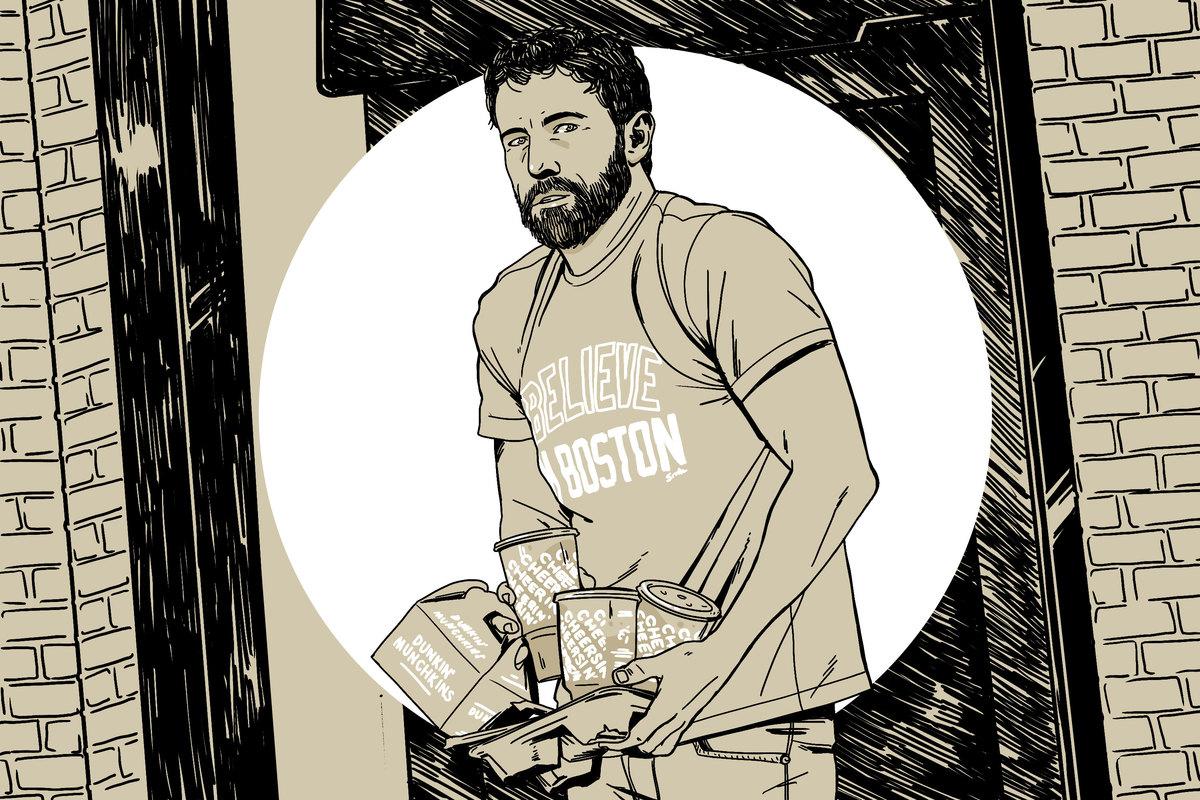
Despite being an Oscar winner, the costar of an iconic J.Lo video, and also Batman, Ben Affleck is arguably most famous for his frequent displays of facial anguish. Not since Michael Jordan—who produced The Last Dance so people would stop posting memes of him crying (my story and I’m sticking to it)—has a celebrity with a thriving career become so thoroughly identified with their own emotional distress. Affleck’s various real-life winces, grimaces, and thousand-yard stares have become as familiar to us as his on-screen exploits thanks to paparazzi photographers; his on-screen performances have been eclipsed by the moments in which his real human feelings are impossible to disguise. He is equally recognizable for acting and doing the literal opposite of acting.
Since his messy and public divorce from Jennifer Garner, Affleck has been something of a tabloid Prometheus, seeming to exist in a state of constant psychic torment as penance for his sins. Naomi Fry wrote about his well-chronicled sadness for The New Yorker nearly three years ago, and the phenomenon has not abated. Last year, he was photographed smoking a cigarette while “wearing” a protective face covering across his nose, like the Lone Ranger taking a 15-minute cowboy-union-mandated break. You can almost hear him calling out to anyone present: “I’ll be back in a second. I’m going outside to rip a butt real quick.” With actual sincere apologies to Pete Davidson’s bleary, heartbroken eyes and Jon Hamm’s linen-pants-clad penis, Ben Affleck is the reigning king of male discomfort captured without the subject’s consent.
For years, I thought the photograph of Ben Affleck swaddled in a beach towel, gazing out to sea, was the platonic ideal of photographs of Ben Affleck. You know the image. Affleck stands, heels-deep in wet sand, eyes cast outward toward the horizon. You can almost imagine he is, like a reverse Little Mermaid, picturing a better life for himself underneath the sea, far from his earthly troubles and out of view of paparazzi photographers such as the one taking his picture at that very moment. You can’t fully make it out, but the shape of his vast back tattoo is visible. It’s a phoenix, which he described to Ellen DeGeneres as “meaningful.” Perhaps it signifies his own intention to rise from the ashes, real or metaphorical. The tattoo also communicates, with even more clarity, that he was the exact right choice to play Batman in Zack Snyder’s movies.
Affleck’s divorce was grist for the gossip mill (as was the resurfacing of a legitimately gross television appearance and his alleged proximity to Harvey Weinstein), which brought him low in the first place. Then came the subsequent wave of haggard tabloid photos that made his pain relatable, at times blurring his understandable emotional dismay, the physical toll of his alcohol use (he is now sober), and his general, shall we say, resting dude face. And even though they came from unseemly sources, we couldn’t unsee them.
It is fitting (if still unsettling) that the new wave of positive press and public perception has come thanks to the paparazzi’s coverage of Affleck’s current thriving relationship. But it’s not his well-documented romance with Ana de Armas that has accelerated the rebirth prophesied by his aforementioned back tattoo; it’s his connection to Dunkin’—which, incidentally, I would bet my Marcus Smart replica jersey he still refers to as “Dunkin’ Donuts.”
Throughout 2020, Affleck and de Armas were photographed walking together, occasionally holding Dunkin’ cups. (In 2019, Affleck admitted he drinks the chain’s coffee every day.) He seemed happy, healthy even, although maybe I’m just projecting there. At the very least, any visible display of distress was hidden behind a face mask. Either way, how far he’d come from what I’d assumed would always be the quintessential photo of him, staring out at the ocean.
Then last week, on New Year’s Eve, a set of even quintessential-er photographs emerged. In this triptych of candid images, Affleck, standing in front of his home, attempts to corral a sizable Dunkin’ order—three or four large iced coffees and a box of munchkins. In one photo, he clutches his breakfast to his chest, his face a familiar tableau of oh no what have I done. His T-shirt reads BELIEVE IN BOSTON (emphasis, the shirt’s own) and his sneakers bear the insignia of Massachusetts-based New Balance. His arms appear strong and vascular, like Bruce Wayne’s are for some reason despite having an office job. The images are so thoroughly Affleckian that for a moment I doubted they were real and believed them to be the work of a body-swapping extraterrestrial who had assumed the actor’s corporeal form and was laying it on a litttttttle thick in an effort to prove he is not an impostor.
While Affleck’s public forays with his girlfriend (who I thought was great in Knives Out, by the way) received positive attention, his dramatic coffee-lift captured the hearts of the internet, especially Massachusetts press. As The Ringer’s Chief Dunkin’ Correspondent [Editor’s note: title invented and self-applied by author], I’d like to take a moment to analyze the multifaceted appeal of these pictures: One, he is in the throes of visible discomfort, which as we have established is when he’s at his most relatable; second, physically he seems to be doing OK, which is heartening; and third, his outfit and behavior in these photos is essentially what my friend Meredith Haggerty (deputy editor of Vox’s The Goods vertical) describes as “Boston camp,” defined, in her words, as: “anything that takes the elements of white ethnic working class identity … and typifies it to the point of parody. So Dunks, the Pats, package stores, parking lots, the more dour/Irish elements of Catholic iconography, really everything about Ireland, windbreakers … it’s ostentatiously suffering. It definitely involves shorts in winter and thinking anyone who likes California is a pussy.”
I understand that “being from Boston” in and of itself is not a sympathetic quality to anyone who grew up outside of Route 128. But it was arguably more sympathetic back before the city’s four major sports teams all won titles, leading to the cold front coming from New York City’s shadow colliding with a warm front of full-on regional hubris in perpetuity. The onset of that period aligns fairly neatly with Affleck’s own two-decade run as a Hollywood leading man. Dunkin’ as a brand harkens back to the Red Sox of the late 20th century: a scrappy, much-maligned underdog that is actually worth millions and millions of dollars. In other words: Ben Affleck. The alignment between his persona and the Dunkin’ brand is almost cosmic, and seeing them merge feels like witnessing a man at peace with himself. We want our stars to be just like us, but ultimately, we want them to be themselves even more.
The whole donut-fumbling affair echoes my favorite Affleck off-screen moment. In the DVD director’s commentary for the movie Gone Girl, director David Fincher reveals that Ben Affleck refused to wear a New York Yankees hat during a scene in which his character (who is also, I am positive, named “Ben Affleck”) has to conceal his identity. According to Fincher, this led to a four-day standoff and production delay while a substitute hat, amenable to all parties, was chosen. Fincher tells this story as an example of Affleck’s unprofessional behavior on set, which in my opinion is letting himself off the hook for allowing the standoff to last four days; once an actor and director cannot agree on a baseball cap—they chose a Mets hat by the way, how hard was that?—for a single day, the two are equally at fault in my book. The dispute is ultimately a trickle of a pissing contest, but I can’t think of Ben Affleck without contextualizing him through the lens of this dispute.
The part of my brain that understands production schedules and location permits and union crew rates agrees with David Fincher that it is poor professional form to grind production to a halt over a hat. But the part of my brain that took shape as a Red Sox fan during their 86-year-long World Series drought kind of thinks it rules. It is the pettiest and least Hollywood way to be a diva, and certainly the most Bostonian. Besides, every actor who plays the Joker decides that his “process” involves mailing anthrax to his costars and firebombing a warehouse to get into character. If Ben Affleck doesn’t believe that the character of Ben Affleck On The Run wouldn’t wear a Yankees hat, then that’s his acting choice and we should honor it.
A corollary to the love of a “local boy makes good” narrative is the feeling that “local makes boy good” as well. We want Ben Affleck to be the Ben Affleck we liked at the moment we liked him the most. For many of us, that means as a young writer and supporting actor with no known baggage or demerits on his record, a fish out of water in Hollywood or, more aptly, a townie out of town. And when I say “we” and “us” I mostly mean “me” and “I.” Most people probably do not have this particular attachment to this particular person. But we all have our own Ben Afflecks, the hometown heroes we’re a little too attached to, and who we hope feel the same way about our hometowns.

And look, this is all in my head of course. There are rumors that Affleck and de Armas have been calling the paparazzi on themselves to generate attention. I don’t know if that’s the case, but if it is, they’re doing a great job. A few friends have even hypothesized that Affleck’s photos are sponsored by Dunkin’, which would be ridiculous. In the recent shots, he was dropping his coffee on the ground, and in one published on New Year’s Day, he is flipping off the camera with both hands as his Dunkin’ order sits by his feet. That would be wildly off-brand as a promo, like if a Skittles ad consisted of 30 seconds of vultures circling the carcass of an antelope before descending on it while the hushed faraway voice of a child implores: “Taste the rainbow.”
But the larger point is that it hardly matters: However these pictures came to us, they’ve defined our understanding of Ben Affleck as much as any of his professional output. And regardless of what level of stage managing has gone into these photo ops, it’s clear that Ben Affleck’s PR renaissance, much like America itself (according to the commercials), runs on Dunkin’.
Josh Gondelman is a comedian living in New York City. He’s currently a producer and writer on Showtime’s Desus & Mero. You can hear him on his weekly podcast Make My Day, and see him tweet at @joshgondelman.